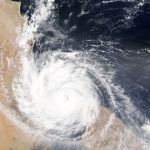 May 25, 2020 11:45 am
Published by Climate Extremes
May 25, 2020 11:45 am
Published by Climate Extremes
A group of international researchers using CMIP6 models to determine how heavy precipitation events will alter with climate change. The northern hemisphere in particular showed a strong warming signal for increased precipitation.
 May 18, 2020 11:02 am
Published by Climate Extremes
May 18, 2020 11:02 am
Published by Climate Extremes
Australian researchers assess the ability of recently released climate models to simulate the climate of Australia and the new scenarios for 21st Century climate change.
 April 23, 2020 2:35 pm
Published by Climate Extremes
April 23, 2020 2:35 pm
Published by Climate Extremes
A recent study by CLEX researchers analysed a sub-cyclone that was part of a major Mediterranean storm in 2012. The results showed how the storm intensified and gave an insight into how these structures can be better forecast.
 April 16, 2020 11:40 am
Published by Climate Extremes
April 16, 2020 11:40 am
Published by Climate Extremes
CLEX researchers and colleagues find Australia's infrastructure would be unable to deal with past flood events and thus is very likely to be unable to mitigate future flooding under climate change.
 April 16, 2020 10:06 am
Published by Climate Extremes
April 16, 2020 10:06 am
Published by Climate Extremes
New research finds Okubo-Weiss-Zeta parameter scheme has superior performance detecting tropical cyclone frequency characteristics compared to the CSIRO tracking scheme.
 April 15, 2020 3:18 pm
Published by Climate Extremes
April 15, 2020 3:18 pm
Published by Climate Extremes
Most climate models correct for current SSTs but don't correct for the reliability of future SSTs. This study shows that making that additional correction has a profound impact on how tropical cyclones will develop in a warmer world.
 April 15, 2020 1:51 pm
Published by Climate Extremes
April 15, 2020 1:51 pm
Published by Climate Extremes
To better assess the degree of organisation in radar observations CLEX researchers developed the Radar Organisation Metric (ROME). ROME's statistical properties suggest it is able to distinguish between the degree of convective organisation, and it also captures different regimes of the monsoon in Northern Australia.
 March 19, 2020 1:29 pm
Published by Climate Extremes
March 19, 2020 1:29 pm
Published by Climate Extremes
This two part paper examines the capacity of ACCESS to simulate tropical cyclone climatology and then used the same model to examine the relationship between climate variables and tropical cyclone formation.
 March 16, 2020 2:47 pm
Published by Climate Extremes
March 16, 2020 2:47 pm
Published by Climate Extremes
Focusing on the land regions around the world, the researchers assessed the representation of annual maximum of daily precipitation (Rx1day) across 22 observational products gridded at 1°x1° resolution.
 March 16, 2020 2:05 pm
Published by Climate Extremes
March 16, 2020 2:05 pm
Published by Climate Extremes
Observational studies over Darwin, Australia, show gravity waves provide a plausible explanation for the patterns of noteworthy variability in mesoscale motions. The findings suggest a two‐way coupling of clouds to their environment










